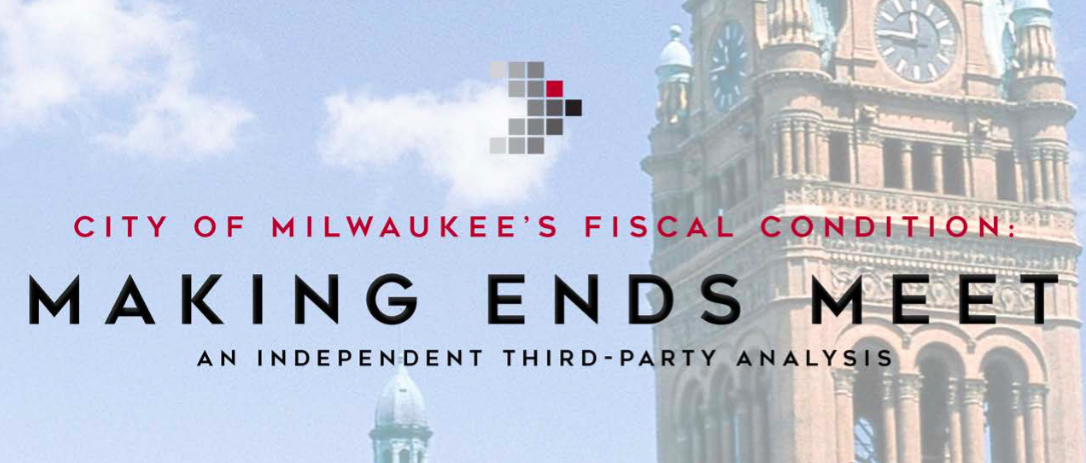 A report released today by the Milwaukee-based Public Policy Forum finds that the City of Milwaukee’s financial outlook is much improved from the depths of the recent economic recession. The report also suggests, however, that “fundamental fiscal change” will be needed if City leaders wish to make and sustain new investments in additional police officers or community programming in the wake of the recent unrest in Sherman Park.
A report released today by the Milwaukee-based Public Policy Forum finds that the City of Milwaukee’s financial outlook is much improved from the depths of the recent economic recession. The report also suggests, however, that “fundamental fiscal change” will be needed if City leaders wish to make and sustain new investments in additional police officers or community programming in the wake of the recent unrest in Sherman Park.
“The City’s revenue structure – which has been imposed upon it by the State of Wisconsin – remains broken,” says the report, titled Making Ends Meet. “Until it is modified to reduce the City’s reliance on property-related revenue, and to provide wherewithal for total annual revenue increases that mirror the rate of inflation, then City finances will continue to be stressed, and any hope for substantial new investment in public safety, community development, and other needs could be out of reach.”
The report uses a set of local government financial evaluation metrics developed by the International City/County Management Association (ICMA) to assess the City’s recent financial trends and what they hold for the future. The Forum undertook a similar analysis in 2009, and found that Milwaukee was “on the precipice of serious fiscal and programmatic disorder” resulting from escalating pension obligations and dependence on revenues from the State of Wisconsin, which had been flat for years.
“Seven years later, the City’s fiscal condition is considerably healthier,” says Forum President Rob Henken, the report’s author. “Successful efforts to dramatically reduce health care costs, stabilize pension contributions, and trim the active workforce have produced relatively calm budgets in each of the past three years, while irresponsible tactics like depleting reserves or deferring needed infrastructure repairs commendably have been avoided.”
Yet, the report also points out that given the extremely bleak set of circumstances facing the City in 2009, an “improved” outlook must be viewed in the proper context. That context includes the following key cautionary findings:
- Over-reliance on property taxes and fees. Intergovernmental revenue – the City’s largest revenue source that consists largely of shared revenue from the State of Wisconsin – declined by nearly $10 million (3.6%) in the 2011-2015 timeframe. That decline necessitated a $23 million (14%) increase in property taxes for the General Fund and a $17 million (17%) increase in charges for services to allow overall revenues to keep pace with inflation. Meanwhile, substantial future growth – even if deemed politically palatable – will be limited by state property tax levy caps and a prohibition against using user fee revenues for general purposes.
- Health care savings soon will be exhausted. Annual employee/retiree health care expenditures dropped from $139 million in 2011 to $96 million in 2015 (31%). Those savings were central to the City’s ability to accommodate a spike in pension obligations, avoid further workforce reductions, and provide expenditure increases to the Milwaukee Police Department (MPD) that allowed it to maintain officer staffing levels. By 2018, the City likely will again have to budget for modest annual health care increases, which will exacerbate its other expenditure pressures.
- Police service needs could threaten service solvency in other areas of City government. Overall expenditures for general City purposes increased $38 million (6%) from 2011 to 2015, with the public safety function accounting for $35 million of that amount. MPD received nearly all of the overall increase, which was needed simply to maintain existing sworn strength levels in the face of expiring federal grants. Maintaining sworn strength levels will not require as big a financial commitment over the next five years, but the pressures associated with replacing retiring officers, modernizing technology, and accommodating natural growth in police salaries and benefits still could crowd out other needs.
- Retirement liabilities and debt are manageable today but growing. The City’s unfunded actuarial liability for Other Post-Employment Benefits (OPEB) stood at $976 million in 2015, which is $60 million higher than in 2011; and its pension fund – while in far better shape than most peer cities – still requires an annual contribution of $60 million, a number that could rise beginning in 2018. Meanwhile, property tax levy-supported debt grew from $561 million in 2011 to $629 million in 2015. Increasing retiree liabilities and debt payments can be managed in the short term, but may pose substantial long-term fiscal challenges.
The report predicts that the 2017 budget will not be overly problematic given the City’s ability to take advantage of one more year of health care savings before costs begin to rise again in 2018. However, at that point, the City again may be forced to choose between addressing the financial needs of the Milwaukee Police Department and reducing expenditures in other departments, a choice that was labeled ‘police or potholes’ in the Forum’s 2009 report.
The report concludes by noting that options for fixing the City’s revenue structure would require legislative action in Madison. The Forum plans to consider those options in subsequent research and also will release its annual analysis of the Mayor’s proposed 2017 budget in mid-October.
“Milwaukee officials, residents, and businesses should take comfort in the City’s improved fiscal condition, particularly when compared to other Midwestern cities like Chicago or Detroit,” says Henken. “Yet, given the expenditure pressures associated with growing public safety and economic development needs and an aging infrastructure, there should be stronger contemplation than ever before regarding the need for change in the City’s basic financial structure.”
The full report – which was commissioned by the Greater Milwaukee Committee as part of its Downtown Task Force initiative – can be downloaded at the Forum’s web site, www.publicpolicyforum.org.
Milwaukee-based Public Policy Forum, established in 1913 as a local government watchdog, is a nonpartisan, nonprofit organization dedicated to enhancing the effectiveness of government and the development of southeastern Wisconsin through objective research of public policy issues.







Leave a Reply